

47-things-ive-learned-in-my-40s_b_7300630. I recently celebrated my last birthday of my 40s.
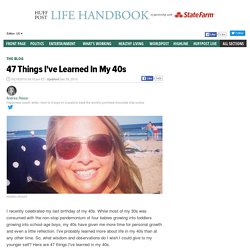
While most of my 30s was consumed with the non-stop pandemonium of four babies growing into toddlers growing into school-age boys, my 40s have given me more time for personal growth and even a little reflection. I've probably learned more about life in my 40s than at any other time. Barry Schwartz: The paradox of choice. Self-Scrutiny Applied with Kindness: Epictetus’s Enduring Wisdom on Happiness... By Maria Popova “Spirited curiosity is an emblem of the flourishing life.”
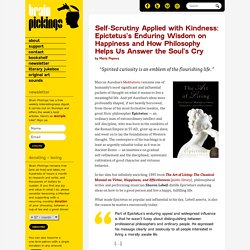
Marcus Aurelius’s Meditations remains one of humanity’s most significant and influential packets of thought on what it means to live a meaningful life. David Whyte on the True Meaning of Friendship, Love, and Heartbreak. By Maria Popova “Heartbreak is how we mature… There is almost no path a human being can follow that does not lead to heartbreak.”
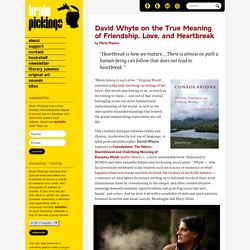
“Words belong to each other,” Virginia Woolf asserted in the only surviving recording of her voice. But words also belong to us, as much as we belong to them — and out of that mutual belonging arises our most fundamental understanding of the world, as well as the inescapable misunderstandings that bedevil the grand sensemaking experiment we call life. The Shortness of Life: Seneca on Busyness and the Art of Living Wide Rather Than Living Long. “How we spend our days,” Annie Dillard memorably wrote in her soul-stretching meditation on the life of presence, “is, of course, how we spend our lives.”
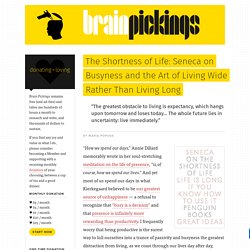
And yet most of us spend our days in what Kierkegaard believed to be our greatest source of unhappiness — a refusal to recognize that “busy is a decision” and that presence is infinitely more rewarding than productivity. I frequently worry that being productive is the surest way to lull ourselves into a trance of passivity and busyness the greatest distraction from living, as we coast through our lives day after day, showing up for our obligations but being absent from our selves, mistaking the doing for the being. Despite a steadily swelling human life expectancy, these concerns seem more urgent than ever — and yet they are hardly unique to our age.
In fact, they go as far back as the record of human experience and endeavor. Seneca writes: Clouds, Trees, Streams. No one, probably, has ever much doubted that these things are nice.
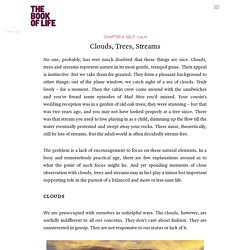
Clouds, trees and streams represent nature in its most gentle, tranquil guise. Their appeal is instinctive. When Leaving Becomes Arriving: Poet and Philosopher David Whyte on Ending Rel... By Maria Popova “Sometimes everything has to be inscribed across the heavens so you can find the one line already written inside you.”
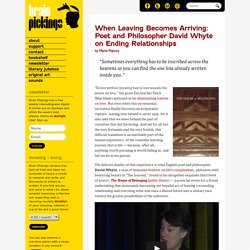
“To love without knowing how to love wounds the person we love,” the great Zen teacher Thich Nhat Hanh cautioned in his illuminating treatise on love. But even when this incremental laceration finally becomes an irreparable rupture, leaving love behind is never easy, for it also asks that we leave behind the part of ourselves that did the loving. And yet for all but the very fortunate and the very foolish, this difficult transition is an inevitable part of the human experience, of the ceaseless learning journey that is life — because, after all, anything worth pursuing is worth failing at, and fail we do as we pursue.
One of the difficulties of leaving a relationship is not so much, at the end, leaving the person themselves — because, by that time, you’re ready to go; what’s difficult is leaving the dreams that you shared together. Plato’s Allegory of the Cave, Animated: History’s Greatest Parable Exploring ... Accept yourself by Thich Nhat Hanh with article by Erica Taxin Bleznak. Beautiful Truths: A Year of Lessons by Erica Taxin Bleznak A year ago I had no idea that the heartbreaking and painful decision to end a 19 year marriage would offer me the most beautiful and poignant teachings of my life thus far.

Here is what I have learned this year: This year I have learned that no matter what choices I make, there will be people who will not agree with the decisions and directions I have chosen. Rilke on Sadness as a Clarifying Force and How Best to Map Out Our Interior L... By Maria Popova “The future enters into us in this way in order to transform itself in us long before it happens.”
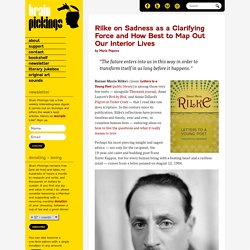
Maya Angelou Recites Her Poem “Phenomenal Woman” Adrienne Rich on Creative Process, Love, Loss, and Public vs. Private Happiness. By Maria Popova “No one’s fated or doomed to love anyone… The accidents happen.”
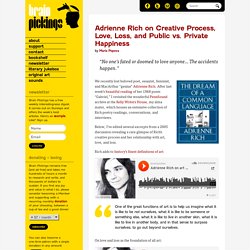
How Relationships Refine Our Truths: Adrienne Rich on the Dignity of Love. By Maria Popova “We can count on so few people to go that hard way with us.”
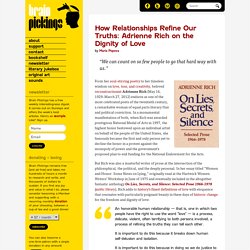
From her soul-stirring poetry to her timeless wisdom on love, loss, and creativity, beloved reconstructionist Adrienne Rich (May 16, 1929–March 27, 2012) endures as one of the most celebrated poets of the twentieth century, a remarkable woman of equal parts literary flair and political conviction. In a monumental manifestation of both, when Rich was awarded prestigious National Medal of Arts in 1997, the highest honor bestowed upon an individual artist on behalf of the people of the United States, she famously became the first and only person yet to decline the honor in a protest against the monopoly of power and the government’s proposed plan to end funding for the National Endowment for the Arts. But Rich was also a masterful writer of prose at the intersection of the philosophical, the political, and the deeply personal. Adrienne Rich on Lying, What “Truth” Really Means, and the Alchemy of Human P... By Maria Popova “The possibilities that exist between two people, or among a group of people, are a kind of alchemy.
They are the most interesting thing in life. The liar is someone who keeps losing sight of these possibilities.” Long before Sam Harris’s memorable assertion that lying is “both a failure of understanding and an unwillingness to be understood,” long before psychologists identified the four most reliable ways to spot a liar, Adrienne Rich wrote beautifully about what is actually at stake when we lie and how lying in all of its permutations — especially those subtle everyday evasions and untruths we tend to attribute to circumstance or to the misguided mercy of sparing others pain — chips away at our basic humanity.
A Moment in Eternity: Adolfo Bioy Casares’ The Invention of Morel. Octavio Paz says calls The Invention of Morel, “without exaggeration… a perfect novel.” According to Borges, “to classify [it] as perfect is neither an imprecision nor a hyperbole.” It has influenced creations as diverse as the works of Gabriel Garcia Marquez, the influential French film Last Year at Marienbad, and the television series Lost. Wikipedia says (albeit, without citation) that “many consider it… to be one of the best pieces of fantastic fiction.” And if that isn’t enough to pique one’s interest, the principal character, Morel, is named after H.G. Wells’ Dr. Lewis Carroll on Happiness and How to Alleviate Our Discomfort with Change. By Maria Popova “There’s no use in comparing one’s feelings between one day and the next; you must allow a reasonable interval, for the direction of change to show itself.”
I am the frequent and fortunate recipient of wonderful letters from readers, many of whom share deeply personal stories of their struggles and triumphs. But few have moved me more than a recent one from a 61-year-old woman from Santa Fe, who has been living with Stage IV cancer for nearly twenty-six years — something she revealed not as a centerpiece of the letter, and not as self-pity or even a complaint, but as a mere factual report for context. My Own Life - on Learning He Has Terminal Cancer. Bertrand Russell on Immortality, Why Religion Exists, and What “The Good Life... By Maria Popova “There are forces making for happiness, and forces making for misery. We do not know which will prevail, but to act wisely we must be aware of both.” Bertrand Russell (May 18, 1872–February 2, 1970) is one of humanity’s most grounding yet elevating thinkers, his writing at once lucid and luminous.
There is something almost prophetic in the way he bridges timelessness and timeliness in contemplating ideas urgently relevant to modern life a century earlier — from how boredom makes happiness possible to why science is the key to democracy. 30 Things To Stop Doing To Yourself. To quote Maria Robinson, “Nobody can go back and start a new beginning, but anyone can start today and make a new ending.” This couldn’t be any closer to the truth in my opinion. However, before a transformation can begin, you have to stop yourself from doing the things that have been holding you back and preventing your transformation. Stop spending time with the wrong people. – Life is too short to spend time with people who suck the happiness out of you. Leo Tolstoy on Finding Meaning in a Meaningless World. There's More to Life Than Being Happy.
Do Not Despise Your Inner World: Advice on a Full Life from Philosopher Martha Nussbaum. My Teacher Is a Monster: A Sweet Modern Fable About Seeing Through the Othern... Happy Birthday, Brain Pickings: 7 Things I Learned in 7 Years of Reading, Wri... By Maria Popova Reflections on how to keep the center solid as you continue to evolve. UPDATE: The fine folks of Holstee have turned these seven learnings into a gorgeous letterpress poster inspired by mid-century children’s book illustration.
On October 23, 2006, I sent a short email to a few friends at work — one of the four jobs I held while paying my way through college — with the subject line “brain pickings,” announcing my intention to start a weekly digest featuring five stimulating things to learn about each week, from a breakthrough in neuroscience to a timeless piece of poetry. “It should take no more than 4 minutes (hopefully much less) to read,” I promised. This was the inception of Brain Pickings. Illustration by Maurice Sendak from 'I'll Be You and You Be Me' by Ruth Krauss, 1954.
Illustration from 'Inside the Rainbow: Russian Children's Literature 1920-35.' Allow yourself the uncomfortable luxury of changing your mind. Donating = Loving Share on Tumblr. Learned Optimism: Martin Seligman on Happiness, Depression, and the Meaningfu... Explore – Being happy and finding life meaningful overlap,... Viktor Frankl on the Human Search for Meaning.
By Maria Popova “Live as if you were living already for the second time and as if you had acted the first time as wrongly as you are about to act now!” Celebrated Austrian psychiatrist and Holocaust survivor Viktor Frankl, born on March 26, 1905, remains best-known for his indispensable 1946 psychological memoir Man’s Search for Meaning (public library) — a meditation on what the gruesome experience of Auschwitz taught him about the primary purpose of life: the quest for meaning, which sustained those who survived. For Frankl, meaning came from three possible sources: purposeful work, love, and courage in the face of difficulty. In examining the “intensification of inner life” that helped prisoners stay alive, he considers the transcendental power of love: Love goes very far beyond the physical person of the beloved. Kurt Vonnegut on Reading, Boredom, Belonging, and Hate. 12 Lifestyle Factors That Make You Feel Depressed. Examined Life: Martha Nussbaum. Philosopher Martha Nussbaum on How to Live with Our Human Fragility.
Martha Nussbaum - The Fragility of Goodness.
A Natural History of Love. Stop Making Plans: How Goal-Setting Limits Rather Than Begets Our Happiness and Success. An Antidote to the Age of Anxiety: Alan Watts on Happiness and How to Live with Presence. Kierkegaard on Our Greatest Source of Unhappiness. Maya Angelou on Identity and the Meaning of Life.